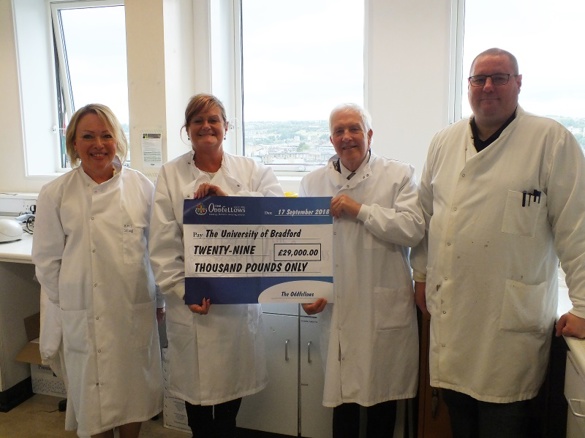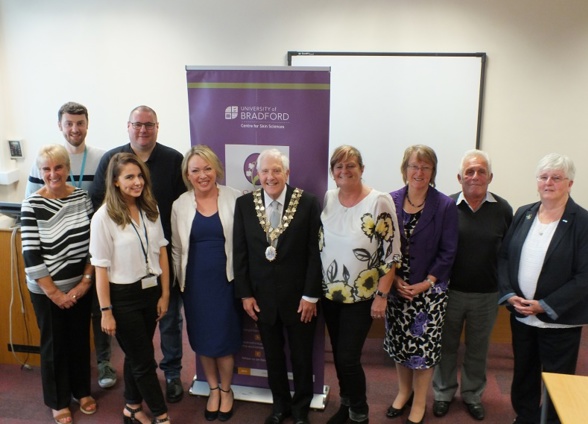Oddfellows funding makes vital Burns Unit research a reality
Updated: 28 Jan 2025
Representatives from national friendly society, the Oddfellows, visited Bradford’s Plastic Surgery and Burns Research Unit (PSBRU) at the University of Bradford on Monday 17 Sept for a lab tour and to present a cheque for £29,000.

Sporting their lab coats to present the final year of funding (L-R) Senior Lecturer in Biomedical Sciences for the Centre for Skin Sciences Dr Julie Thornton, Oddfellows’ Chief Executive Jane Nelson, Oddfellows’ Grand Master (Chairman) William Henchliff and CSS Experimental Officer Dr Stephen Sikkink.
The donation marked the final stage of a major three-year funding partnership which began in 2015 and has totalled £88,000.
The money has been used to directly support the Unit’s delivery of a potentially life-changing project into hard-to-heal wounds and burns.
Officially titled ‘Exploiting the Hair Follicle as the Preferential Source of Wound Healing Cells in the Human Skin’, the project has seen the research team, grow fibroblast cells found in human hair follicles and through new technologies investigate their importance in the wound healing process, specifically under diabetic conditions where the healing process is compromised.
The Oddfellows’ visiting guests, which included its CEO, Chairman and members from Bradford District, were taken through the project’s latest findings and thanked for their support.
The Unit was founded by Professor David Sharpe following the fire disaster at Bradford City Football Club in 1985, where 56 people lost their lives and 258 others were injured. Today, the PSBRU is led by Mr Ajay L Mahajan, Consultant Plastic Surgeon, at the Bradford Teaching Hospitals NHS Foundation Trust and its allied hospitals in the UK. He is also Honorary Senior Lecturer at the University of Bradford.
Speaking about its work, Dr Stephen Sikkink, Experimental Officer of the University of Bradford’s Centre for Skin Sciences (CSS), said: “With diabetes diagnoses rapidly increasing and an ever-ageing population, our continued research into the cellular changes that result in impaired would healing is incredibly important.
“We’d like to thank the Oddfellows for their support in funding our research project. We’re at the stage where we can now utilise new technologies, which could help us provide valuable insight into why the wound healing process in diabetic patients is impaired. Understanding this will help us develop new clinical targets for treatments and therapeutic interventions. These have the potential to ultimately provide life-changing benefits.”

With the University of Bradford’s CSS Plastic Surgery and Burns Unit team, Oddfellows Chief Executive Jane Nelson, Grand Master (Chairman) William Henchliff and members from Oddfellows Bradford District.
The Unit is the most recent Oddfellows HA Andrew Memorial Fund beneficiary. Established in 1971, the Fund provides financial support over a three-year period to a project or organisation involved in, or conducting medical research in the UK. So far £1,029,000 has been donated, with previous recipients being Parkinson’s UK, the Alzheimer’s Society and the Stroke Association.
The project was successfully nominated for funding in 2015 after members from the Oddfellows’ Huddersfield and Bradford Branches brought the Unit’s life-changing work to its attention.
Jane Nelson, Chief Executive of the Oddfellows, added: “Giving back is at the heart of our Society. Our members are bonded by the shared desire to help others, so we’re delighted that our donation has supported the great work of the Unit, including the continuation of research that could positively impact so many lives.”
To find out more about how our Society helps fund life-saving scientific research, visit our HA Andrews Memorial Fund page.




